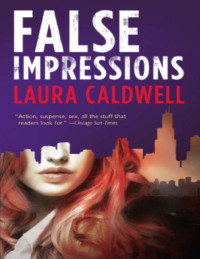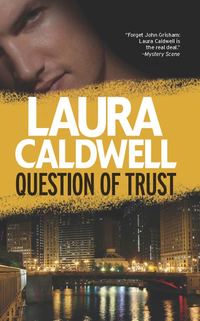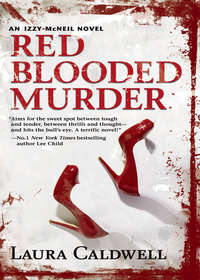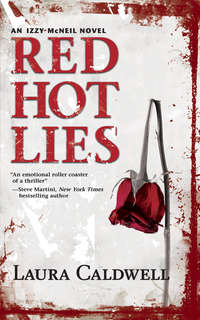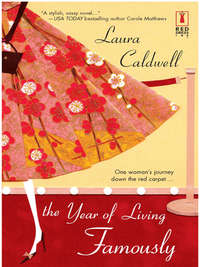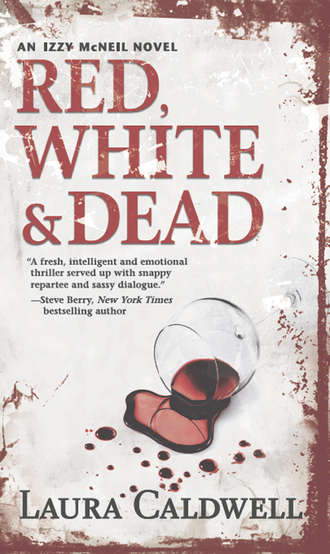
Полная версия
Red, White & Dead
And he’d been right. Dinner was a blast. And a turn-on.
But sex wasn’t why he was thinking about her now. No, not at all. Another emotion drove his thoughts, one just as primal, but much more violent.
9
“What was dad working on when he died?”
My mother turned from the kitchen counter, where she was collecting her cell phone, putting it in her purse. Since I’d come out of her library, she had been talking about Spence, how it was so funny that sometimes he couldn’t seem to dress himself. I hadn’t known how to segue into the topic again, so I just blurted it out.
My mom cocked her head. I watched her intently for her reaction, not wanting to upset her, but she just blinked a few times, shook her head a little as if she was surprised, and said, “Why these questions all of a sudden?”
I was sitting on a tall chair at the island. “I don’t know. I’ve just been thinking about him, I guess.”
She turned back to her purse. “It makes sense, I suppose.”
“What do you mean?”
“Well, you’re at a transition point in your life, a time when you can go one way or another, and it’s usually at those times that we look back and try to make some sense of it all, see if we’ve done the right things, if we’ve ended up with the right people. And we remember people who aren’t with us anymore.”
“Is that what you do? I mean, do you think about whether you ended up with the right people, wonder if you did the right things?”
My mother turned around again and looked at me. She put her hands on the counter behind her and leaned back.
In the last year, I had learned something about Victoria McNeil, something she thought no one else would ever know. We hadn’t spoken about it since. Not directly. But now, I think we both knew I was referring, obliquely, to the topic, and yet we both knew the specifics would remain unspoken. My mother was from the school of holding your emotional cards close to your heart, and after all she’d been through in her life, I respected that.
A thump from above us, then another. Spence dropping something upstairs. He could be clumsy, especially when he was distracted and running late. My mother smiled at the sound. “I ended up with the right people,” she said. “And you?”
“Well, since I haven’t ended up with anyone, it’s kind of hard to say right now.”
“What about that young guy you mentioned?”
I laughed a little. I hadn’t told my mother how young he was.
“What?” she said.
“Nothing. I saw him last night.”
“Fun?”
I remembered the feel of my legs around him, my back against the rough wall of the stairwell. I thought of him later in bed, curving around me, how he fell asleep first and I traced the ribbon of red tattooed in a trail down his arm. “Yeah, it was fun.”
“And so?”
I shrugged. “Who knows?”
Theo hadn’t said anything specific about getting together again. It gave me a tickle of discomfort. Was all that stuff about dying to see me just about one thing—sex? Then again, what did I care?
“And how’s Sam?” my mom asked.
“We haven’t spoken in a few weeks.”
“Do you miss him?”
I shifted around on the chair. “Yes. And no. I mean, I miss lots of things about him, and I miss having someone in my life, but sometimes I don’t mind being alone. I don’t mind deciding what I want to eat for dinner and what I want to do for the weekend. I like that part a lot.” I looked down at the book my dad used to read me, played with its cover. Inside, I had tucked the clipping about my grandfather’s death. “But then again, sometimes it’s lonely.”
My mother chuckled. “And so goes the circle of life.” She nodded at the book. “So all this about your dad …”
“Yeah, I don’t know.” You’re okay now, Boo.
My mother stood away from the counter, collecting other things in her purse—her keys, a small water bottle. “You asked what he was working on when he died. I don’t know all the specifics. I really never did. Your dad didn’t talk much when it came to his work.”
“Didn’t that bother you?”
“No. I knew he had to keep quiet because he was working sensitive cases.”
“He worked for the Detroit police, right? Wasn’t it just the usual robberies and stuff?”
“Your father worked out of the Detroit police office, and yes, he worked on things like robberies and even a serial killer, but he also profiled for the federal government. The primary case he was working on when he died was federal.”
“What was it?”
“A Mob case. The killing of the Rizzato Brothers.”
“A Mob case?” I repeated. I thought of Dez Romano, Michael DeSanto.
“Your dad had a certain knack for organized-crime cases. They were always asking him to consult.”
“Did he ever get any threats from them?”
“From whom? The Mob?” My mother shook her head. “He was just an average consultant. Never in the forefront.”
I thought about the man running behind Dez and Michael as they chased me out of Gibsons. He hadn’t been at the forefront there, either. But somehow, whoever he was, I doubted that he was just an average consultant.
10
Louis (“Louie”) and Joseph (“Big Joe”) Rizzato were born and raised in Chicago after their parents emigrated from Ischia, Italy, an island off the Gulf of Naples. The Brothers Rizzato, as they were sometimes called, became involved in criminal activity early in life, eventually became Mob enforcers and were known for their violent and often cruel tactics. Louie rose to the position of Mob boss, but roughly six months after that, both brothers disappeared on the same night.
I looked away from the computer for a moment.
I had gone home from my mother’s and called Aunt Elena. No answer. I hung up without leaving a message. I wanted to get her on the phone, rather than crisscrossing with messages for weeks.
I looked then at the stack of résumés by my keyboard, copies of ones I’d sent out and now just waiting for me to follow up on them. When I worked at the firm of Baltimore & Brown, I specialized in entertainment law, mostly because Forester Pickett, the media mogul, had taken a shine to me and given me a large chunk of his work—negotiating contracts for radio and TV personalities, defending the company or hiring local counsel, when cases of all kinds were filed against it. The phrase “trial by fire” had never been more apt. I hadn’t known what I was doing when I started, but I learned, and I learned fast, if only because there was no other way to stay afloat.
When Forester died and I lost all my work, I’d been set adrift, and unfortunately the city didn’t have much entertainment law work to go around. When actors, musicians and directors from Chicago hit it big, they usually headed for one of the coasts. And so, unless I wanted to move, I was going to have to start thinking creatively about my employment possibilities. I’d already contacted most of the big law firms months ago, and after that attempt rendered nothing I could get excited about, I tried a gig as an on-air legal analyst. I even initiated an investigative report on a very wealthy but very crooked attorney, and that investigation eventually uncovered a class-action lawsuit scam. But after my bizarre run-in with the law as a murder suspect, no station was jumping at the chance to put me back in front of the camera. Hence the pile of résumés I’d sent out for in-house positions at different corporations.
But I was too curious about that newspaper clipping about my grandfather, and what my mom had said about my dad, to make follow-up calls. I had pushed away the stack of résumés and done an Internet search for the Rizzato Brothers. And found that description of them—known for their violent and often cruel tactics.
I sat back, away from the computer, and tried to think.
My father had been working on a Mob case—that of the Rizzato Brothers—when he died. The Rizzato Brothers were Mob enforcers, one eventually a Mob boss, and they had disappeared. Meanwhile, I had been hanging out, rather innocently, with a Mob figure and was being chased by him when suddenly a vision appeared—an auditory one at least—of my dead father.
It sounded like a load of crazy.
Enough of this. I turned off the computer monitor and lined up my stack of résumés, then started making job-hunting calls.
I got a lot of Sorry, nothing right now kind of responses. I got a few vague We haven’t decided anything yet, but we’ll let you know kind of answers. I got a lot of anxiety as it seemed that nothing was opening up and nothing would anytime soon.
I looked at my watch. Six o’clock in the evening Rome time. I picked up the phone and dialed the number for my aunt Elena.
She answered this time. “Cara!” she said, hearing my voice.
It had been so long, and we chatted about everything—Charlie, my employment status, Chicago. We got into that seamless conversational space that weaves around in a pleasantly aimless way. I had always loved my aunt, and the older I got, the more I enjoyed her.
But as with my mom, I couldn’t just dive in and say, Is it possible your brother is alive, or do you think I’m losing it? And although I’d told Maggie I would contact Elena about visiting, I hadn’t spoken with her in over a year. It seemed awkward to suggest a houseguest too quickly.
Instead, it was less uncomfortable to say, “So, tell me about your mom and dad.” I had the book my father used to read on the edge of my desk. I pulled it forward, opened it and took out the yellowed clipping. Thieves Kill Man at Shell Station.
“What about them, cara? They were wonderful people. I guess you never got to meet my father.”
“No. And I’ve been thinking about family lately. Grandma O was Italian and Grandpa Kelvin was Scottish, right?”
“That’s right. Their love affair was something of a scandal. No one in my mother’s family had been involved with anyone who wasn’t Italian. Actually, no one had ever been involved with someone who wasn’t originally from Naples, if you can believe that. She met my father at a drugstore. It was in the winter, and they were both buying cough drops. My mother, Oriana, was a few years out of high school. My father was a few years older than her. It was one of those things you hear about—they saw each other, they both looked at shelves without talking, and when my father finally got up the courage to speak to her, they didn’t stop. They talked for hours in that aisle.”
“And that was that? They were just in love and they lived happily ever after?” When had I gotten so cynical?
“Well, no. There was resistance to them dating. Her family wasn’t happy at all, especially when they got engaged only six months later. But like I said, they were in love.”
I thought of Sam. We had been in love once. There had never been a doubt about that.
“Did they stay in love?”
“Yes, always.” She sighed a little. “I used to wonder if I was only seeing that love through the eyes of a child, if maybe it didn’t really exist, or maybe as an adult I would realize that it was very different than what I’d thought. But no, now that I am an adult …” She laughed. “Incredibilemente, I am much more than an adult. Well, I see how pure their love was. It wasn’t always easy for them, especially my dad, coming into this Italian family. His family was already scattered around the country and didn’t see each other often, but my parents had this powerful connection. Everyone could see it.”
I drew my finger over the news clipping. “And then Grandpa Kelvin was killed.”
Elena was quiet, then, “Yes, he was stabbed.”
“At a gas station.”
“How did you know that?”
“I found a news clipping.”
“Ah. Well, yes, you’re right. He was putting air in his tire one night at the side of a gas station, and he was killed.” A pause. “Did your father ever talk about that?”
I got a zing through me—your father. “No. He never mentioned it. I guess we were too young.”
“Yes, too young,” she repeated. “And you and I never spoke about this, either.”
“No. How old were you when your dad died?”
“Sixteen.”
I felt envious for a second, thinking that she had eight more years with her father than I did with mine. “And my dad was eighteen then.”
“That’s right.”
“I know he went to college.” I could remember my father telling me this. “And you moved to Italy to be with family, right? After Grandpa Kelvin died?”
“Yes. My mother was having a very hard time. She went to Phoenix to try and forget. Her family thought it would be best if I finished high school somewhere else instead of going with her. They thought it would be good for me to be away, too, somewhere new where everything wasn’t about my father.”
“So you went to Naples?”
“No, I lived with a cousin in a lovely area, in Frascati, in the hills, outside of Rome.”
“Was it hard for you to be away from the U.S.?”
“Yes and no. Italy is certainly different from the United States, different from every country, in fact. But throughout my whole life my mother had been telling us about Italy. The stories about Italy were our nighttime tales. I found much of that had sunk in and made a difference when I moved here.”
“How often did you get to see my dad after that?”
“Not very often.” Her voice was somber. “That was one of the hardest things.”
“Were you not close?”
“It wasn’t that.” She said nothing else.
“So what was it?”
“I suppose it was simply that he lived in the States, and I lived in Italy. I fell in love with the country, and I stayed.”
Could he be alive? “What do you know about how he died?”
“He died in a helicopter crash, Isabel.” She said it like Ee-sabel. “You know that.” A pause. “Did your mother not talk to you about this when you were young?”
“Yes, but I suppose that as an adult, I wonder about the details.”
“Such a tragedy. It was horrible.”
“Do you still think about him?”
“Of course. All the time.”
Do you ever see him like I did? Do you ever hear him?
But before I said anything, Elena was suddenly saying she needed to go, that it was lovely to talk to me.
“I had some other questions about my dad,” I said.
“And I’d love to answer them, but right now I must go. I have a work dinner.”
“Where are you working?”
“I’ll tell you next time we talk, cara.”
It was obvious she wanted to get off the phone. “We should stay in better touch,” I said.
“Yes, cara, you are right.”
“Do you have an e-mail address?”
“Of course. We e-mail, we text. We’re very forward in Rome. Everyone walks around the city with their cell phones attached to their cheeks.” She gave me her e-mail address. “Must go. Ciao, ciao.” And then she hung up.
I leaned forward and turned on the monitor again.
Although their bodies have never been found, copious amounts of blood (identified as blood from both Louie and Big Joe) were found in the basement of their parents’ home the day after their disappearance. No arrests have ever been made in the disappearance of the Brothers Rizzato.
11
The next few days skidded by quickly, an inefficient bunch of days where I thought of little but my father and checked my BlackBerry religiously for a call or e-mail from my aunt.
I had e-mailed her the morning after our talk, mentioning that I might visit Italy. I heard nothing back. I called the next day and left a message this time. Again nothing.
I sent out some more résumés, made follow-up calls and a few halfhearted attempts to establish new contacts. Still nothing.
I grew frustrated, short-tempered. I could think of little else to do about my job search or my dad search. I talked to Mayburn but he was in too much of a twist about Lucy and the fact that she was living with Michael to be of much help. I couldn’t shake the feeling that if I could just speak to Aunt Elena again and find what else she knew, if anything, about my dad’s death, then maybe I would know where to go from there. Or, even better, I could just put the whole thing away. I didn’t want to go any further with my mother because she had endured a lot of loss over her life. The last thing she needed was her bored, out-of-work daughter shooting around assertions about what she’d maybe heard in a dark stairwell.
Meanwhile, the one thing getting me through my week was someone else on a dark stairwell, and it wasn’t my dad.
Theo had called Tuesday night, and again Wednesday and Thursday, and each night I met him on the stairwell, and each night it was the same. And yet even better.
He worked during the days at his software company, and so he was gone every morning, leaving me flushed and sleepy and satisfied. It was as if Theo rounded down the sharp angles that I collected every day and that I’d been collecting from my months off work.
Friday morning, I got up an hour after Theo left and found a message on my voice mail. It was from Elena. She’d left it at three in the morning Chicago time, a vague, “Hello, cara. I am sorry I haven’t been able to get back to you. Let’s chat soon.” And that was it. She didn’t mention my possible visit.
I called her again. Heard nothing back. I e-mailed again, telling her once more that I was considering a visit and mentioning a few dates. I didn’t go so far as to inquire if I could stay with her. Even though we were family, our contact had been so minimal over the years it felt rude.
On Saturday morning, I received an e-mail. Cara, she wrote, I do not think you would enjoy Rome in the summer. There are so many tourists, and it is about to get very hot. Also, I am busy working in a new galleria that has just opened in the last few years. It is a personal passion of mine, very close to my heart. Perhaps you should come in October or November?
I sat back from the computer as my cell phone rang.
“Izzy?” a woman’s voice said when I answered. “It’s Lucy DeSanto.”
“Lucy!” My voice went high. She was about the last person I expected to hear from.
In my mind, I pictured her—a tiny, toned blonde with a pixie haircut and a big smile.
“Hi,” she said. “So, I heard that you ran into Michael.”
Michael ran after me, I wanted to say, but instead I just mumbled a chagrined, “Yeah, I did.”
Lucy and I had a brief but complicated history. The cold fact was that I’d originally met her because Mayburn asked me to pretend I was a neighborhood mom (and wanted to be her friend) so I could get inside her house and onto her husband’s computer. The ruse worked, and the evidence I collected landed Michael with a federal indictment. But it also worked its guilt on me. I genuinely liked Lucy, and I felt bad duping her. When she found out what Mayburn and I had been doing, I thought she would be pissed as hell. But instead, Lucy—sweet, elegant Lucy—had been forgiving. She’d always been in love with her husband, but she hadn’t known he was involved with the Mafia. That knowledge had devastated her, and yet she was glad the secret was out. Then she’d started up with Mayburn, and the last few times I’d seen her they’d seemed over-the-moon happy.
And yet now here we were, back on familiar territory, where I found myself apologizing, once again, for messing around in her life.
“That’s okay,” she said. “I know you did it for John.”
I chuckled. “It’s funny to hear him called John.” I’d met Mayburn because he was the private investigator often hired by my former law firm. And no one called him anything but Mayburn. “He misses you,” I said.
“I miss him.” She sighed. “But, Izzy, I have kids. And I want the kids to grow up with their dad, with a family that’s a whole unit. I loved Michael for a long time, and he says he’s done with that business.”
I thought of Dez and Michael standing in Gibsons, looking so similar. “I hope I didn’t complicate things for you. Mayburn just wants to make sure you’re safe.”
A moment of quiet. “I want to talk to you about John.”
Suddenly, there was a shriek in the background.
“Lucy?” I said, alarmed.
Another sigh. “It’s my kids. I’ve been promising to take them to the nature museum for weeks now, and we’re finally going this morning.” She paused. “Is there any way you’d want to come with us?”
“I’d love to see you, but …”
“What?”
“Well, does Michael know you’re asking me?”
“No. He’s already gone this morning. He’s networking to try and find a new job.”
“Hmm, that’s what I’m supposed to be doing, too.”
“Look, I’ll tell you one thing. I’m trying to make this work with my husband, and I’m trying to be honest with him so he’ll be honest with me. But I am not going to tell him I’m seeing you. No way. I’m just so confused.” A pause. “I really need a friend. Someone who knows John.”
I trusted Lucy. It was impossible not to. But still … “I’m not sure, Lucy.”
A pocket of silence. “I understand.” Then a tiny sniffle. “I just feel like I’m going crazy. Crazy.”
“God, I’m so sorry.”
One of her kids yelled in the background. “Noah, give me one minute!” she said, sounding as if her voice might break. “I have to go, Izzy. Don’t worry about it.”
The heartache in her voice killed me. “Of course I’ll meet you.”
“Really?”
“Sure.”
“Oh, thank you. Thank you. We’re going to the nature museum at ten. Do you know where it is?”
“Fullerton, near Lake Shore?”
“That’s it. Inside, there’s a big stuffed bear to the right. My kids love it, so we’ll be there for at least fifteen minutes.” Another shriek in the background. “I’ll see you there, Izzy.”
I called Mayburn and told him. “She wants to talk to me about you.”
“What about me?” he said quick, anxious. “I’m not sure.”
“Well, as much as I want to hear what she says, I’m not sure I like this. What about Michael?”
“She said he’d left the house. And she’s not telling him we’re meeting. Do you trust her?”
“Hell, yes.”
“Me, too. I’ll call you when we’re done.”
At a few minutes before ten, I parked my Vespa outside the Peggy Notebaert Nature Museum, an oddly unnatural-looking structure made of glass and sand-colored steel. It was surrounded, however, by the rolling, green lawns of Lincoln Park and gold ornamental grasses that fluttered in a balmy breeze. Behind the building, ducks in a pond glided by a snapshot view of the skyline.
The North Pond Café, once a favorite of Sam’s and mine, was at the other end of that pond, and I stood outside the museum for a moment, gazing in that direction, thinking of the last time we were there. It was a few months ago, when we were trying, and failing, to patch up our relationship.
I made myself shut down the memories. Inside the museum, the sounds of children’s voices filled the place. I paid and made my way past parents corralling kids inside the entrance. A few steps down the hallway, I easily found the giant white polar bear standing on its haunches, its mouth open in a ferocious, silent roar.
I looked around, didn’t see Lucy or her kids. I checked my watch, wondering if I’d misunderstood her. I was about to call her cell phone, when I heard someone shout my name.
Lucy was hustling down the hallway, wearing white jeans cuffed at the bottom and a light blue cotton blouse with short sleeves. She had a kid by each hand. Noah, a boy of about five or six, had a smear of something red on his face, which was also red with frustration. “I don’t want to see the bear again!” he whined. Noah’s little sister, Belle, was a three-year-old mini replica of Lucy, who looked at her big brother with a calm kind of wonder that said, What’s all the fuss about?




